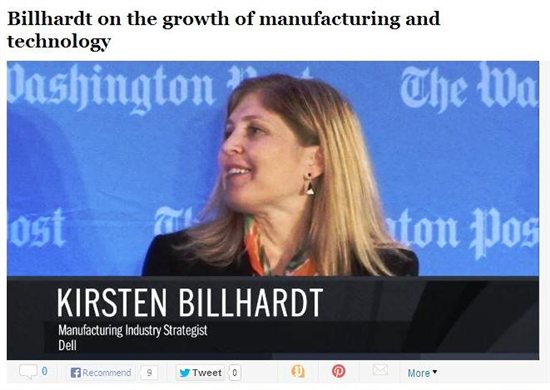“Is this going to be good for people when the refrigerator starts talking to the washing machine…Is this really going to make our lives better?”
The Washington Post pulled together a group of thought leaders ranging from U.S. Senators to industry executives for the America’s New Manufacturing conference last week in Washington, DC. The purpose was to discuss how manufacturing in America is being transformed by both technology and a younger and more diverse workforce and, ultimately, how to grow manufacturing in the U.S.
I was honored, and a bit star-struck, to be asked to join this distinguished group in a panel discussion around Innovations and Advanced Technology. Alongside Michael Gazarik of NASA and Michael Molnar of the National Institute of Standards and Technology, we had a wide-ranging conversation of both the opportunities and potential pitfalls that come from advances in technology.
When reporter and panel moderator Joel Achenbach started the conversation with the question above, I was excited to answer with a resounding “yes!” As an example, I referenced the amazing work Google is doing with self-driving cars, where, in a pilot, a blind man was able to drive himself through a drive-thru. The opportunity to bring personal mobility to people with disabilities, or to those considered too old to drive safely today, will absolutely improve the lives of millions. And this is just one of many examples related to how ‘connected devices’ can really make our lives better.
Our Founder and CEO Michael Dell often says that “technology is about enabling human potential.” In our work with customers, we see this every day. We see how cloud computing can help create personalized treatment plans that improve lives for children with neuroblastoma, a deadly form of pediatric cancer. We see how test scores in children can be improved, while reducing IT costs. And for manufacturers, we see how Dell can help entrepreneurs bring their products to market six months faster, and help a large company like Mazda realize performance gains of 80-400% through storage virtualization.
Unfortunately I didn’t have the opportunity in the panel to circle back and answer Joel’s question, “what would the refrigerator say to the washing machine?” Perhaps this was a farfetched example, and there is probably little benefit that could come from the refrigerator’s ability to report to the washing machine. However, to better illustrate the point, as a mom of two young boys, I would love the refrigerator to reach out to my local grocery store, and let them know we are running low on milk. And then I want to wake up the next morning to find two fresh gallons of organic 1% milk on my front porch. Believe it or not, this type of connection is actually a glimpse into our future. Having technology solve some of these micro-issues of keeping a household running smoothly would make it that much easier for me, and all the other busy parents out there, to devote more time to family and work, and less time on routine chores.
From society-wide problems to keeping a stocked fridge, technology has and will continue to improve life for us all. I welcome you to click here for more insights that came out of the America’s New Manufacturing conference.

